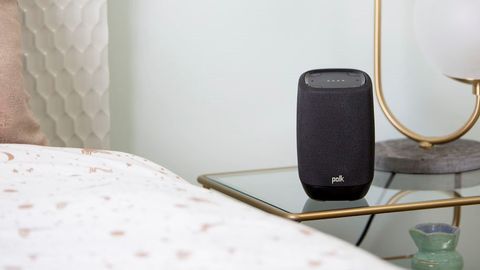TechRadar Verdict
The Polk Assist is a solid Google Assistant-based smart speaker. It packs in all of the technology - software and hardware - that makes Google’s series of smart speakers so great, and it sounds even better thanks to Polk’s custom tweeter and woofers. It doesn’t have any unique features of its own, however, and its penchant for playing music sometimes supersedes its ability to hear your chosen wake word.
Pros
- +
Great clarity
- +
Quick setup
- +
Chromecast built-in
Cons
- -
Small soundstage
- -
No phone call support
- -
A bit overpriced
Why you can trust TechRadar
In just a short period of time we’ve gone from no Google Assistant speakers on the market to more than a half dozen. The most famous of these are the Google Home, Google Home Mini and Google Home Max smart speakers put out by Google itself, but the list includes the confusingly named Sony LFS50G, JBL Link 20 and Link 300, and Panasonic SC-GA10 as well.
The Polk Assist, the latest speaker to bear Google Assistant inside its plastic shell, shares a lot in common with its smart speaker brethren. Most obviously that includes Google Assistant and Chromecast Built-in, but there’s also a lot borrowed in terms of design and audio power.
That said, and given just how many speakers are currently out there, the Polk Assist is a solid speaker … just one that’s really similar to what’s already out there.
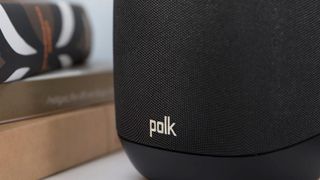
Design
Aesthetically, the Polk Assist looks a lot like the JBL Link 20 - one of the first third-party Google Assistant speakers on the market. It’s a squat and rectangular with a mesh-covered front face, and a plastic top that plays host to four control buttons in each of the corners.
These buttons include play/pause, volume up and volume down as well as a button to get Google Assistant’s attention rather than using your chosen wake word.
Also on top, you’ll find the LED markers which indicate volume levels and if Google Assistant is actually listening, or just going about its everyday business. The lights only have two colors that we’ve seen - red and white - and aren’t nearly as interesting as the Google Home’s colorful rainbow wheel, even if it’s just as pragmatic in use.
The lower half of the speaker doesn’t have anything really interesting going on: the front has a silver Polk logo and the back contains the power port and mute button that allows you to manually disable Google Assistant.
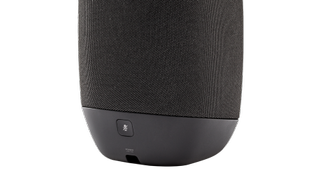
What that means is that you won’t find a 3.5mm aux port like you’d find on a traditional Bluetooth speaker, but thankfully the Polk Assist comes with Chromecast Built-In and the latest version of Bluetooth to allow you to stream music wirelessly.
To setup the speaker, you’ll need to download Google’s Home app, if you don’t already have it installed. The process takes just a few minutes and you’ll be guided to select which music providers you’d like to default to when playing songs and be given a quick audio tutorial.
Performance
As primarily a speaker first and a smart personal assistant second, the Polk Assist really nails it. Audio sounds crisp and clear at higher volume levels (the higher the better, honestly) and music sounds better here than it does on the standard issue Google Home. It’s no Google Home Max, and certainly no competition for Apple’s $349 (£319, AU$499) HomePod, but it doesn’t skimp on the parts that count.
That said, in terms of performance, you can expect warm mids and highs and hearty bass response. There’s good clarity throughout the audio spectrum, regardless of which method you’re using to stream music, and it gets loud enough to easily fill small to medium-sized rooms.
That’s the good news. The bad news is that you won’t be blown away by the speaker’s soundstage - what’s on offer here is narrow and self-contained. You won’t get a rock stadium-esque experience here, and will instead get something more akin to a tiny desk concert with sounds emanating from a singular point in space.
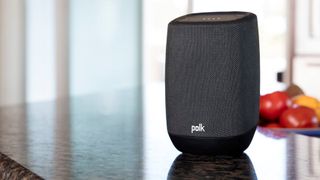
So, overall, audio performance is good but nothing to write home about.
And that audio performance is the better of the two parts - the Polk Assist isn’t the best smart speaker on the market. We say that because, as of right now, most third-party Google Assistant speakers don’t have the full functionality of Google's first-party canisters: The Polk Assist can’t make phone calls right now, for example, nor can you bring up the equalizer settings in the Google Home app.
The latter is minor, sure, but not being able to make calls using the Assist is a major feature that’s currently MIA.
The other minor problem is that, infrequently, the Polk Assist had problems hearing us over the loud din of a song. It wasn't something we could replicate repeatedly, but the times that it happened left us feeling less confident in the speaker overall.
Thankfully the Assist can still control devices synced up with the Google Home app just fine, and it can be added to speaker groups to create multi-room audio setups. We'll just have to settle for 90% of the functionality here.
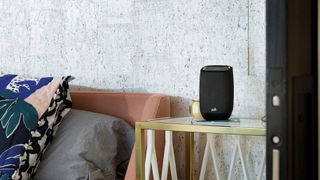
Final verdict
At $199 (£179, around AU$270), the Polk Assist is a solid, if-not-super-impressive smart speaker. It offers basic smart functionality (sans calling) and it does so with the added bonus of good audio playback. It serves as a good upgrade over the $129 Google Home, but, if you’re looking for a tried-and-true Hi-Fi experience, you might want to consider the more expensive Google Home Max or Apple HomePod instead.
- These are the best smart speakers in 2018
Nick Pino is Managing Editor, TV and AV for TechRadar's sister site, Tom's Guide. Previously, he was the Senior Editor of Home Entertainment at TechRadar, covering TVs, headphones, speakers, video games, VR and streaming devices. He's also written for GamesRadar+, Official Xbox Magazine, PC Gamer and other outlets over the last decade, and he has a degree in computer science he's not using if anyone wants it.

Lenco launches 3 budget turntables all perfect for beginners – plus a light-up disco ball 'record stabilizer'

Happy Plugs' cheap noise cancelling headphones look like a budget Sony WH-1000XM4, in the best possible way

This affordable new hi-res music player is the iPod replacement I've been waiting for
